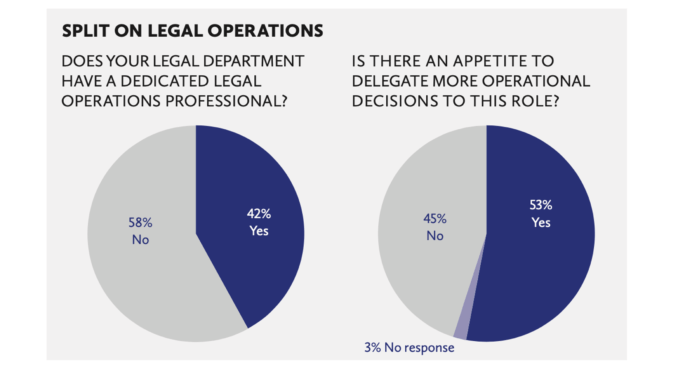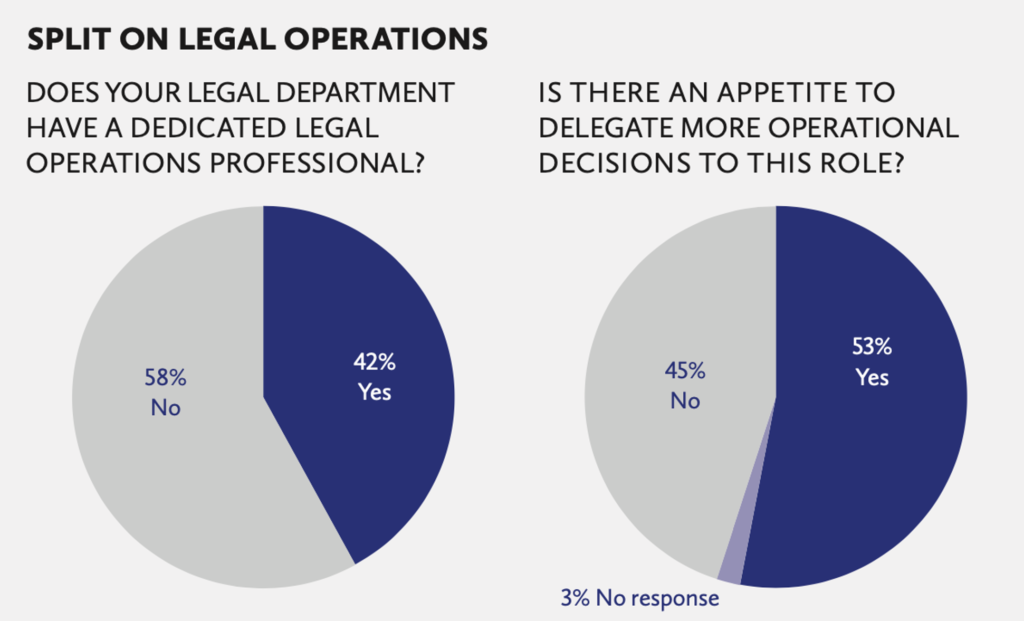
A recent survey of inhouse teams found one very poignant insight: 45% of GCs and CLOs did not have an ‘appetite’ to delegate more operational ‘decisions’ to a dedicated legal ops professional (see chart).
While the rest of the General Counsel Report by FTI Consulting, eDiscovery giant Relativity and legal sector adviser Ari Kaplan, was useful, it was perhaps within the boundaries of expectations, e.g. there were plenty of glowing comments from GCs about how useful legal ops experts were, such as: ‘The breadth of what our head of legal operations does is huge and touches every area of the legal function.’
But, the part about GCs not having ‘an appetite’ to delegate ‘decisions’ to legal ops – now, that’s really interesting, primarily as it seems to be the opposite of some of the testimony.
It also matters a lot. It matters because over the last few years so much has been heard about how vital legal ops folks are to inhouse teams, how they are helping to transform work streams, improve how the company spends its money, and how they help to handle contracts and the data within them – all with the end goal of enabling the business as a whole to operate more smoothly.
But, if GCs don’t want to delegate these decisions – as ‘appetite’ suggests volition not just need – and given that GCs in any type of business are already incredibly busy and under pressure, then what does that mean?

One has to go to the most logical result first: if key operational tasks are not delegated by a team leader who is already overworked, then those tasks (on the balance of probabilities) won’t get done, because the overriding mandate of any GC is to protect the company from imminent risk and that will take precedence – and understandably so – over long-term ‘legal production system’ modifications.
But, if GCs are not delegating to legal ops experts, then QED their skills and expertise cannot be used to improve workflows, reduce costs (internal or external), and no doubt will make it harder to onboard new tech for inhouse teams, such as CLM platforms. So, although risk is handled, cost levels and efficiency remain static at best, at worst they may deteriorate. Moreover, not having a better handle on contracts and their data could increase corporate risk.
So, what’s going on here? Is this GCs being reticent to hand over decision-making and not wanting a parallel group within the legal team to have a lot of power over how they work?
Or, does this all have a much more innocent explanation? Artificial Lawyer asked report author Kaplan what he thought the cause was.
‘The most common limitations shared by the respondents to expanding the legal department to include a legal operations professional were budget and size. Some of the participating general counsel manage legal departments that they consider too small to employ a dedicated legal operations leader,’ Kaplan said.
‘For others, budgetary constraints limited their expansion opportunities in this area, despite the efficiency gains that many acknowledged were likely from engaging a legal operations leader,’ he added.
In short, from his perspective, it’s not that some GCs don’t want to delegate more decision-making powers to legal ops experts, it’s that they can’t delegate because they don’t have the budget to enlarge the legal ops group, or in some cases don’t even have one, and so one cannot delegate to what doesn’t exist.
And that makes sense. But…..there is still one small query. The survey question asked: ‘Is there an appetite to delegate more operational decisions to this role?’, not: ‘If you had a bigger budget would you delegate more tasks to this role?’
That puts a slightly different spin on things. In short, is this a sign that, however subtle it may manifest itself, that some form of territorial struggle is sometimes taking shape between the legal work part of the inhouse team, i.e. GC and fellow lawyers, and those whose job is to improve their work and its effects? Perhaps, perhaps not. It’s not clear yet. But, it would not be impossible given how organisations work.
While, if it is the benign case, i.e. simply not enough budget, it underlines the point that legal ops may well work in the larger legal teams, but smaller ones – which ironically are perhaps most likely to benefit from improved efficiency as it will allow them to do more with a small budget – don’t have legal ops experts on staff to help.
And perhaps the reason is: none of the above, and this lack of appetite is caused by something else other than budgets or overlapping job roles? For example, GCs were worried about overloading that person with too many tasks…? We don’t know, yet. But, we need to, as legal ops will only grow in importance.
Conclusion: it looks like we need more research here. The sample was 60 senior inhouse lawyers, many of which worked at very large companies, which although indicative is perhaps not fully representative. An additional set of questions that really drilled down into the delegation aspect would be illuminating, as well as how the division of legal labour and legal ops labour is balanced out within legal teams of different sizes and budgets. Either way, thanks to FTI, Relativity and Ari Kaplan for the survey and report. AL looks forward to next year’s and resolving the questions here.